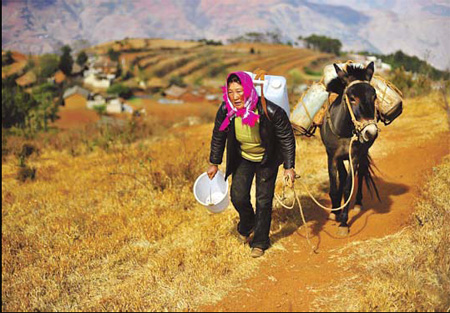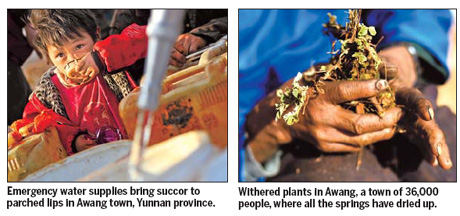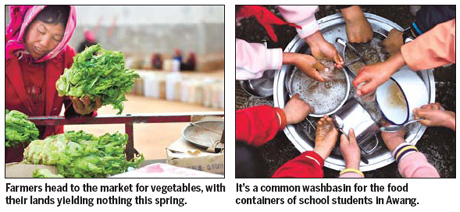Waiting for rain
![An old man keeps his eyes peeled for the government's water tanker, beside a long line of empty buckets placed there by the villagers in Haike. [China Daily] An old man keeps his eyes peeled for the government's water tanker, beside a long line of empty buckets placed there by the villagers in Haike. [China Daily]](http://images.china.cn/attachement/jpg/site1007/20100412/00114320f5750d2cef9a0c.jpg) |
|
An old man keeps his eyes peeled for the government's water tanker, beside a long line of empty buckets placed there by the villagers in Haike. [China Daily] |
Yunnan resident Jia Guofen is up at the crack of dawn.
Since last August, the 41-year-old resident of Haike village, Awang town, a mountainous southwestern area of Yunnan Province, has been riding her mule to fetch water from a well at the foot of a mountain, located 5 km from her home.
Up and down a narrow, winding path they go, taking a pause every 50 meters.
"I set out at 7 am and return only in early afternoon," Jia says. She manages to bring home 100 liters of water every day.
Jia is not alone. Many farmers of Awang, Dongchuan county, spend hours, walking miles in search of water. Nobody has the time or energy to tend to the fields.
Most of the youngsters have left to work outside the province, leaving mostly the elderly and the very young to face the acute water shortage.
The remote town, located 160 km from the provincial capital Kunming, used to be plagued by floods and landslides during the rainy season. Bridges were destroyed as the rivers swelled. Now, they are a mere trickle.
As recently as on June 22, 2009, a storm sweeping through Awang triggered massive mudslides in villages such as Haike, Tuoluo, and Yantou, blocking off a 400-km stretch of country roads.
In August, residents of Heinaoke, Haike village, had to be evacuated and moved to higher land.
The same area is now facing an acute water shortage.
"It was common for local officials like me to sound warnings about floods and mudslides," says vice-town-chief Zhong Bin.
"We never imagined that one day we would be sounding a warning about drought."
Since last August, the farming town of at least 36,000 people has been faced with a severe drought.
By March, 13 big villages with a combined population of 13,000 had been declared drought hit.
 |
Yantou and Haike are among the worst off.
"The early spring crop has yielded nothing this year. And one third of local farmers have no drinking water," Zhong says.
Take Songzhiao, Yantou, that stands 2,300 meters above sea level. For the first time in 30 years, almost all the wells have dried up.
The villagers would spend hours to collect every trickle of water coming out of tiny cracks in the mountains, until March 31 when the local government organized emergency supplies.
The entire village is up early to watch out for the water trucks, making their way along mountain paths flanked by dry grass and cracked fields.
In Awang town, a priority is ensuring water supplies to the primary schools, which continue to run.
"Our students are like tender flowers. They are the future of this town. We have to make sure they have enough water," a teacher with the Tuoluo Village Primary School says.
Despite this, students are being advised not to read out loud, so as to conserve their saliva.
 |
 |
 0
0 






